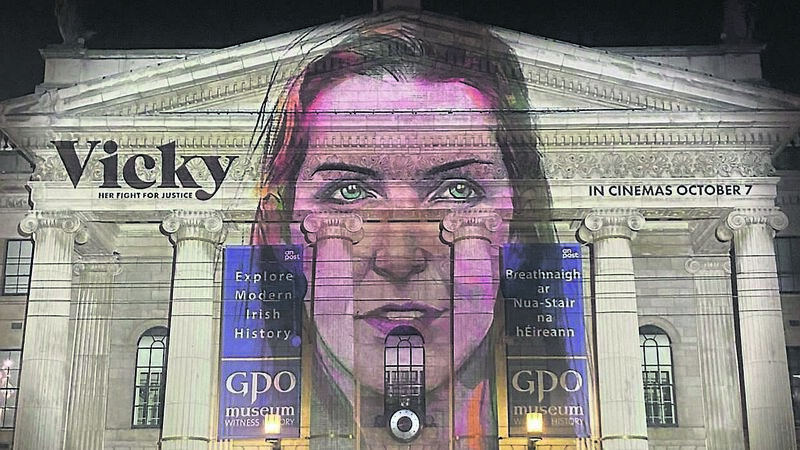Ireland's heroines are on the big screen fighting the good fight...

A portrait of the heroic Vicky Phelan lights up the GPO to celebrate the release of the award-winning documentary ‘Vicky’. Portrait by Conor Merriman.
For many of us, they are true heroines, although poor Sinead was pilloried 30 years ago when she tore up a photograph of the pope on Saturday Night Live, calling out the Catholic Church for cover-ups of paedophile priests, accusing the Vatican as being the enabler.
Such was the vicious backlash that in New York’s Times Square, a steamroller destroyed O’Connor CDs to the cheering of onlookers. Clearly, Sinead was a woman before her time.
In an interview with the , Kathryn Ferguson, the director of the documentary on Sinead, entitled , said of her subject’s world headline-grabbing gesture: “It wasn’t cool, on-trend activism. A lot of it was very unpalatable. The sexual abuse scandal in the Catholic Church? It’s not something people wanted, or were ready, to hear.”
He was fond of the shaven-headed singer with the voice of a (troubled) angel. But his avuncular act was a bit much at times. Some said his interview of Sinead in her priest’s garb was exploitative as she didn’t seem altogether well.
Whatever her mood, she never fails to stop us in our tracks. But she suffers for her stances.
Ripping up the photo of Pope John Paul II and her exhortation to ‘fight the real enemy’ resulted in death threats, radio boycotts, Frank Sinatra saying he wanted to ‘kick her ass’, and a hostile reception at the Bob Dylan 30th anniversary concert soon afterwards.
But Sinead is strong, able to stand up for herself in the often misogynistic world of rock ‘n roll. (When she was starting out as a singer, she claims her record company said she should terminate her pregnancy as it would interfere with her career.) But she went ahead and gave birth to Jake.
A true icon, Sinead is owed an apology for not being taken seriously when she spoke truth to power.
Vicky Phelan took on the State. The documentary about her, indicating instant name recognition, is simply called Vicky. By refusing to sign a non-disclosure agreement, Vicky ensured that the Cervical Check scandal was exposed.
Not only does she have her family to look after, not to mention ongoing treatment for her terminal diagnosis of cervical cancer, but Vicky has been campaigning for better services for the women of Ireland, 221 of whom were let down so terribly by the State. It’s a tall order. But in the documentary, she comes across as caring, humorous and furious, although never shrill. There’s a certain serenity about her, coupled with a steely determination.
As the director of , Sasha King says, as a country, we have an appalling history of decades of treating women poorly, particularly concerning health.
“We’ve progressed in so many other ways, you would think that we would go out of our way to make sure things like that never happen again and overcompensate for mistreatment in the past, but this happened so recently. If Vicky had chosen to sign a non-disclosure agreement in the past, we wouldn’t know what happened,” said Sasha.
On Joe Duffy’s radio programme last week, there was a clamour of women talking about their experience of the severely painful condition of endometriosis. This condition, which affects one in ten women in Ireland, is where tissue, like the lining of the womb, starts to grow in other places. But many of the women on the phone-in show spoke of being dismissed by their male doctors.
One woman said she was told by her doctor that mental anguish can manifest itself in the body. In other words, she was ‘imagining’ her pain.
There was the barbaric surgical procedure of symphysiotomy whereby doctors sliced through the cartilage and ligaments of the pelvic joints to widen the pelvis for vaginal birth. It was based on fundamental religious belief. The thinking was that no more than four caesarean surgeries could be performed safely. Contraception may then be needed to limit family size - anathema to the church. Also blighting our history are the Magdalene laundries.
Ireland was and sometimes still is a cold house for women.







 App?
App?




